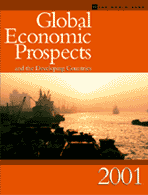|
|
|
World
Bank Makes Grab For Global Brain The Bretton Woods Project It is not safe to assume that the World Bank is on the defensive. Despite the recent protests, official commissions and unofficial research pieces which have contested the Bank's legitimacy and effectiveness James Wolfensohn has many new plans for expanding the Bank's areas of influence. One of the highest items on his agenda is an attempt at a major land grab on the internet, seeking to build a new $70 million supersite - "the premier web entry point for information about poverty and sustainable development." The Global Development Gateway (GDG) scheme is an ambitious attempt to gain more control over what analysis and opinions on development topics are deemed relevant and sound. The site aims to provide an overview of key policy issues with links to other sites with "good" information about them. Many grassroots and campaign-oriented sites will be weeded out on the grounds that they contain unsubstantiated opinions, not validated research. The site will be heavily marketed to officials, journalists, students, NGOs and others. Although tightly controlled by the Bank at this stage, the Gateway will be launched next year as an apparently independent foundation, giving the appearance of neutrality to unsuspecting surfers who are unaware of who is behind this apparently helpful site. The Bank is trying to impress G8 governments and others with a cutting edge, hi-tech, multi-stakeholder project that will deliver knowledge and expertise to communities worldwide. The buzzwords associated with it are "transparency", "interactivity" etc. However, the Bank is so clumsy in its attempts to bring people into this initiative that it has alienated many potential partners thus revealing once again its top-down approach to project planning and its failure to recognize that there are many diverse and conflicting views on development. This project also illustrates the Bankšs failure to understand that the internet encourages horizontal networking, multiple opinions and links, rather than centralized planning and coordination. Wolfensohn has asserted that the internet can be a confusing, yet very powerful medium for people working on international issues. Activist groups such as Indymedia and Peoples' Global Action have demonstrated this, leading WTO officials to say that Seattle was not lost in the negotiating rooms, nor in the streets but on the internet. The GDG may pose a serious threat to campaign- and policy-oriented sites that offer information from other sources. Indeed, some sites which need a certain number of visitors to keep going would be likely to go bust. One major criticism is that the Bank is drastically overestimating what can be achieved in one website - "trying to kill five birds with one stone." The GDG aims to provide: easy access data about aid agency projects, a database of organizations working on development, an online bookstore, nested country websites, and a selection of links to analysis on over 100 policy topics. The analysis links are probably the most problematic. The Bank is recruiting editors or Topic Guides, who will be given the impossible task of trying to examine websites across the world to see what exists on their issues, then post links to whatever reports they feel match their "quality" standard. Roberto Bissio, Director of Instituto Tercer Mundo (Third World Institute) in Uruguay has likened the GDG to having the World Bank publish newspapers in countries where such resources are lacking: "There would be public outrage if someone proposed it, as the press is supposed to be free." Attempting to filter development-related information to produce a global supersite for so many audiences is extremely unrealistic. Is it clearly not possible or desirable for one person or a small team to claim that it has produced links and highlights which represent views of all stakeholders (civil society, governments, official agencies, companies etc.) on any development topic. This is obvious to many people, but has been well-expressed by Anriette Esterhuysen, Executive Director of the Association for Progressive Communications: "The Global Gateway will: de-contextualize the content it disseminates neutralize and de-politicize information create an illusory atmosphere of consensus and universality, while proclaiming 'diversity' draw funding away from local information gateway development initiatives Most significantly, initiatives like the GDG, no matter how inclusive they attempt to be, are mediated by the North. It is very hard to find the boundaries of what constitutes "reasonable opinion" within single organizations, villages or families, let alone when you get to a national or international level. The meaning of development and many of the Gateway topics is itself strongly contested. Development includes everything that has to do with everyone in the South. On such a megasite reports from African think-tanks or NGOs are likely to be crowded out by major World Bank publications on the same issues. Many detailed criticisms have been made against the Bank's planned approach. But the Bank has done little to respond to them. Indeed, on 7 November Wolfensohn personally posted to the consultation list-serve that he felt the response to the Gateway proposal was good, that they are going to continue with it and will work with "those leading international NGOs and community-based organizations that wish to experiment with us." This was a frank admission that the consultation exercise they have been conducting was largely a sham and Wolfensohn was using his diplomatic muscle to marginalia opponents and steamroll groups into collaborating without questioning the fundamentals of the Bank's plans. The World Bank already gets four million page hits per month on its main website. It recently invested a huge amount of resources into a series of other internet and distance learning initiatives. Combined with the GDG, these must be seen as a strategic attempt to capture the commanding heights of information technology..
|

